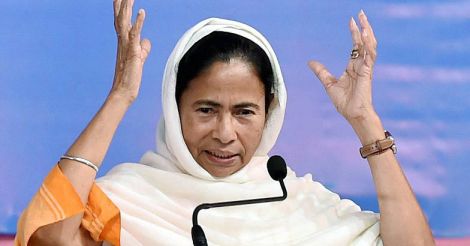Two women chief ministers have voiced concerns that China is stoking trouble in their states. Jammu and Kashmir chief minister Mehbooba Mufti has not only pointed a finger at the cross border promotion of terrorism by Pakistan but also said China was poking its nose into Ladakh standoff.
China shares a long border in the mountainous heights of Ladakh and has annexed some of its parts, while the rest have been handed over by Pakistan. China has occasionally hinted that Ladakh, which is often dubbed as Little Tibet, was once part of the Chinese empire. But the central government, which uses agencies like Intelligence Bureau (IB), Research and Analysis Wing (RAW), and the military intelligence in the border states, has not publicly stated anything about the meddling by the northern giant neighbor.
Meanwhile, Mamata Banerjee is angered by the outburst of violence in Darjeeling Hills, and the defiance of the West Bengal government by the Gorkhaland Movement Coordination Committee, comprising Gorkha Janmukti Morcha, Gorkha National Liberation Front, and other outfits, demanding greater autonomy for the Gorkha areas of Darjeeling and Kalimpong.
Despite the chief minister's declaration that she will crush the agitation, it has spun out of control during the last six weeks, affecting normal life, and trapping thousands of tourists in the Himalayan hot spot. Though the central government has rushed paramilitary forces, it has not publicly made any offer to mediate, treating the issue as a law and order matter to be handled by the state government. The BJP, which has fought elections in alliance with Gorkha Janmukti Morcha, is also in a dilemma. Supporting the demand for Gorkhaland means losing its support in the plains, where they would be termed as anti-Bengali.
Mamata has also raised concerns over Chinese meddling in the state and accused the central government of not doing anything to control Darjeeling when a foreign power was stoking protests against her.
India and China have maintained to their positions largely in the northern and eastern borders under an agreement to preserve peace and tranquility based on a series of agreements between New Delhi and Beijing. But recent years have seen an aggressive China pushing its way both in Jammu and Kashmir as well as in Bhutan. Tensions have risen in the last three months in Bhutan, where both are accusing each other of intruding into a valley, which belongs to Bhutan.
While India has said China has tried to occupy the land of its ally Bhutan by building roads, China has accused Narendra Modi of sending troops into the Doklam Valley to oppose Chinese land claims in the valley. India has said the valley is important for two reasons – it rightly belongs to Bhutan and India will offer all assistance to Bhutan. Secondly, if the valley comes under Chinese control, then it would make Indian border more vulnerable for sudden Chinese attacks.
Interestingly, neither defense minister Arun Jaitley nor home minister Rajnath Singh has taken any public initiatives on the allegations made by Mehbooba and Mamata. Singh has also not responded to the demands that center should send a mediatory team to talk to the Gorkhaland Movement Coordination Committee to call off its strikes.
The center feels Mamata has been very harsh on the agitating political parties as her government has attached bank accounts of its leaders and put cases of incitement, violence, possession of deadly weapons and attempt to murder on them.
The central government feels Mamata wants to employ the same successful tactics she had used to crush the Maoists in Jangalmahal areas of the state in 2016. But Gorkhaland agitation, which has been flaring up and dying out since the 1980s, needs to be handled more sensitively, as there is a strong public support for the movement.

























 West Bengal Chief Minister Mamata Banerjee addresses people during 350th birth anniversary of Sri Guru Gobind Singh in Kolkata on Thursday. PTI Photo by Ashok Bhaumik
West Bengal Chief Minister Mamata Banerjee addresses people during 350th birth anniversary of Sri Guru Gobind Singh in Kolkata on Thursday. PTI Photo by Ashok Bhaumik